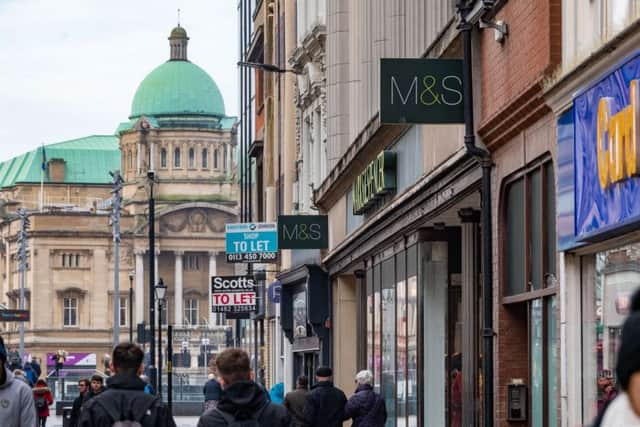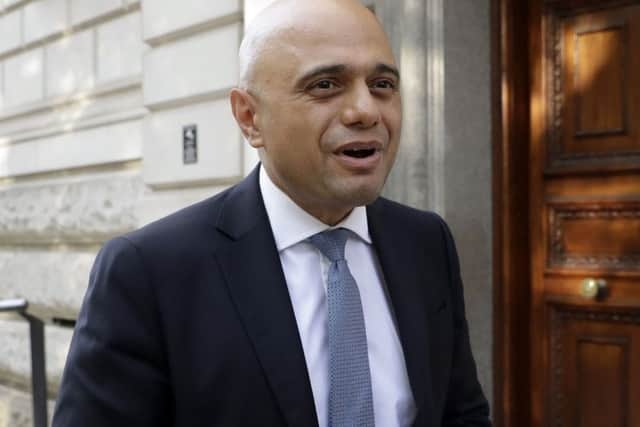Why business rates must be reviewed if our high streets are to be saved – Beckie Hart
High streets are the lifeblood of our communities, but the sight of boarded-up shops is all too common and impacts not only on retailers but the overall attractiveness of a town or city.
Advertisement
Hide AdAdvertisement
Hide AdI believe that more needs doing to strengthen our high street. But it’s not all down to the internet, there is an invisible enemy that is damaging many traditional retailers – a business rates system that is failing badly. Ask in your local shop and many owners will be able to tell you in detail about the burden they place on being able to stay afloat, never mind being able to grow.


Business rates are a tax on property used for business purposes. They are charged on properties such as offices, shops, pubs, and warehouses – most non-domestic properties will attract business rates. They are calculated based on a property’s ‘rateable value’ in an open market. But over time the system has become uneconomical, unsustainable and, frankly, unintelligible. In short, it’s a system in desperate need of reform.
For a start, the business rates system is entrenching regional inequalities. Part of this problem is the uncertainty around when the next rates revaluations occur. The last revaluation period was extended from five years to seven. We can now expect revaluations every three years. But in practice, any longer than one year means business rates lag far behind economic cycles and – over the years – the significant rises in UK property costs.
Advertisement
Hide AdAdvertisement
Hide Ad

The result is a system that rewards those places already on their way up in the short-term, but eventually pulls the rug from under them. And one that punishes those areas that are already struggling. It can mean local authorities being underfunded, in areas where businesses are on the rise. Or companies going under, creating a vicious cycle of decline and dependence.
This call for reform will only get louder now as businesses are set to see their costs soar by £660m as business rates increase with inflation. Companies will see their business rates increase by 2.1 per cent in line with the expected September interest rate.
And it’s the way that business rates currently work against the economic cycle that makes the tax uniquely damaging. Just compare this approach with other types of tax. Fuel duty, or corporation tax for example, increase when business is booming in proportion to the amount of fuel you buy, or profit you make. It’s a much fairer system. One that doesn’t reinforce economic disparities – like the current business rates system does.
It also puts businesses off from investing. At the heart of the problem is the way we assess property. If you’re a climate-conscious business owner and you want to improve your office, or your energy supply with solar panels – or new energy-efficient lightbulbs – any real efforts to invest will see your business rates rise. It certainly doesn’t give businesses a strong reason to invest in the UK. Let alone in areas where capital is most sorely needed.
Advertisement
Hide AdAdvertisement
Hide Ad

To understand the impact of these problems, we need only look at the headlines of the past few weeks. Debenhams, once a stronghold of the British high street, fell into administration. Exactly ‘why’ is a complicated question. But I’ve yet to read an explanation that doesn’t cite business rates as at least part of the cause. And the same has been true of countless firms over the years.
And every year, thousands of firms try to appeal their business rates bill. It more than suggests a lack of confidence in the system. While we have seen warm words and small solutions from the Government over the years, these tweaks have only served to reinforce the idea that business rates are a high street issue rather than a problem for our whole economy.
The more sticking plasters we add, the greater the signal that the system is broken and in need of a fundamental rethink. So here’s our solution. Government should consider initiating a comprehensive, independent review looking at how we build a fair and sustainable business rates system.
And Government could use the Budget as an opportunity to unlock enterprise and investment – by announcing a 12-month holiday on new properties and property improvements, as well as the removal of downward transitional arrangements.
Beckie Hart is the Yorkshire and the Humber regional director of the CBI.